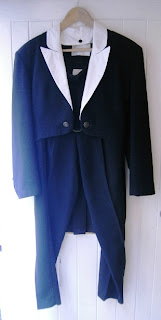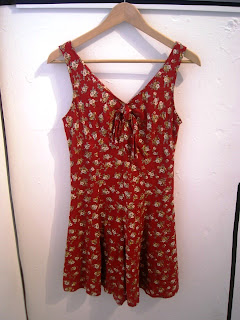This week in the Arts Space, was another familiar SHOP-face indeed ...
Jayne Marshall, one half of SHOP and a Director of the CIC. You may
have read in the last
newsletter, that Brett and Jayne both decided to put their
money where their mouths were, when saying art and creativity should be
a universal pursuit ... so, they're trying things on the 'other side'
of SHOP by having an exhibition each in the Arts Space this July.
Jayne followed Brett's
'By a Click of Paint' last week with her exhibition, 'Currency: A Novel on Five Walls'. Here's what she had to say about it, on her own website,
Bookyish:
After going to see Alain de Botton talk about Religion for Atheists, and being struck by what he said about art, I decided – as I run a vintage clothing shop and arts space
which preaches ‘art-for-all’ – I should challenge myself by having an
exhibition of my own there, something I have never done before, or ever
considered doing.
I did, however, immediately have a clear idea of what I would like to
do. All the exhibitions we have had in the arts space over the past
two years have been visual, and my thing is words, so I thought I would
have an exhibition based on the art of literature.
Bit of background: when I was twenty-one and freshly graduated, I
wrote a list of all of the things I wanted to achieve before I died (I
actually put ‘and/or thirty’, as obviously at that point I assumed there
is no life after thirty) and one of the entries was, ‘write a novel’.
Although this compulsion has always been present in some dark corner of
my mind, I didn’t act upon it until about four months before my
thirtieth birthday, finally finishing it exactly one week before my
thirty-second birthday this year.
The full novel is of a normal novel length and I toyed with the idea
of recreating it exactly over the walls of the art space. However, I
then became shy and began to prefer the idea of having five extracts
printed up and pasted onto each wall. The extracts make a collective
story of their own (as well as each extract individually), whilst also
giving a brief glimpse into the main preoccupations of the full novel.
Accompanying the extracts are a synopsis of the novel and a bit of info
about me, which I’m told is called an Artist Statement.
Here is the Artist Statement and synopsis, followed by some pictures of the exhibition and the extracts in full:
ARTIST STATEMENT
I’m Jayne. I have an MA in Literature, but rarely put it to any use as I run a vintage clothing shop (the one next door).
Before there was the shop, books were my first love and I’ve always
wanted to write my own novel. I promised myself, aged twenty-one, that I
would do it by the time I reached thirty. However, the right time
never presented itself and I didn’t end up revisiting the idea until
four months before my thirtieth birthday. I finally managed to finish
Currency one week before turning thirty two in April this year.
The complete novel is standard length, but for this exhibition I have
chosen to exhibit five chronological extracts. The extracts make a
collective story of their own (as well as each extract individually),
whilst also giving a brief glimpse into the main preoccupations of the
full novel.
The story gathers around the disappearance of, and subsequent search
for, a father. It is dually narrated, through the voices of the father
and his daughter. It is primarily concerned with power and identity,
but also family and loss.
SYNOPSIS
The three central themes of
Currency are: Power, Identity
and Time – and the fluid nature of each. The main motifs employed to
illustrate these themes are: money (lack of, causing powerlessness), sex
(use of, to gain power), the family (crisis of identity) and aging
(time passing). The story is told through a dual narrative, using the
first-person voices of the protagonist, Rose, and her father, David.
The novel is set in the present day and uses the back drop of The City
as the main location.
The story begins a few days before the protagonist’s thirtieth
birthday. The first three chapters are concerned with illustrating how
dislocated she has become, as a result of a combination of the three
main themes. At chapter four, all the main characters are gathered for
the protagonist’s birthday party, the narrative then switches to the
father for chapter five. He introduces himself and his story, which is
essentially the same as his daughter’s – though they stand at the
opposite ends of life, and both feel utterly alone, yet they unknowingly
mirror each other and each other’s crises. The father looks back at
his own life and sees only its losses and missed opportunities, he feels
life has only happened to him and around him.
The party is the central crisis point of the novel. As the
protagonist is reaching the depth of her own personal crisis, at the
same time, the novel is reaching its also – which is the point at which
David makes the decision, unknown at the time to the other characters,
to disappear. During the party, we also meet Rose’s aged Uncle Pete,
who asks her to assist him in finishing a book he has been writing for
over fifty years, called
On Being Conscious. She promises to do so, even though she is annoyed with him for burdening her further with it.
From here, once the main characters discover that David is missing,
the novel centres on the search for him by the protagonist, her mother
(Gwen) and her sister (Lizzy). As Rose searches for her father, so she
is forced to take responsibility for her life and her own issues of
identity, powerlessness and loss. A sub-plot develops in which she
begins a relationship with a person (Neil) whom she has continually
rejected previously, and in doing so has to come to terms with
abandoning her use of sex as a tool for power.
Throughout the search, the reader is privy to what David is doing and
going through, although of course the protagonist, her mother and
sister, are not – remaining unable to fathom what has happened to him,
and subsequently to their family. David has taken off across Europe,
hoping that taking freedom will allow him to feel empowered. However,
finding that this is not the case and not being able to find a way to
reconcile himself to what he has done and the issues he was running
from, finally, the reader witnesses David’s suicide (the ultimate taking
back of power) and the end of his narrative role.
The final three chapters are narrated by the protagonist. We see her
and her family attempting to come to terms with the heartbreaking
realisation that they know very little about their father/husband and as
a result are failing/have failed to find him. They decide they must
‘let go’ and we witness a kind of funeral, before the protagonist, in a
subversion of the usual happy ending, commits somewhat apathetically to
marry Neil. The final scene sees Rose discovering that her Uncle Pete
has died (after the wedding), without ever having finished his book, and
so without ever having found any wider meaning to life.
EXTRACT 1
PARIS
At the bar, I
ask the waiter to pay. I pretend to myself that Lizzy’s overstuffed
purse, full of receipts and credit cards and cash, is mine. It feels
good.
Page 8
EXTRACT 2
CURRENCIES
As
I walk through the city, the spring weather is warm and light. I
notice for the first time how green the trees have become and everywhere
seems to be teeming with animals and children. The fresh, warm air
hits my body, making it flash with heat in patches. I try and remember
a time when I didn’t feel so unhinged. A mechanical street sweeper
keeps pace with me. If I speed up, it catches me, and if I fall back,
it falls back too. It seems to have a malicious intent towards me, not
wanting to give me moment free from its monotonous whirring and grinding
that is pounding through my head, making it throb painfully. I really
need a sweet drink.
Page 26
EXTRACT 3
DAD
I suddenly just had to get out of there: that party, those people – my family.
Page 60
EXTRACT 4
DAVID
I
run my hands over the book shelves, dotted here and there with items
that are so familiar as to have become completely invisible to me. The
ornaments, the pictures, and the Russian dolls my granddad bought for my
mum when she was a little girl, they must have been sitting there all
my life. The crack over the smallest doll’s eye, where the paint is
flaking off around it, so recognisable I may as well be looking at my
own reflection. But, when did I stop noticing that they were there?
Page 76
EXTRACT 5
GIVING UP, LETTING GO
We
stop and hug. I think how strange we probably look, two grown women
embracing in a suburban street, for a few long minutes, under the
moonlight. When we break off, we smile at each other and turn back
towards the house in silence. After a while I find the courage to ask,
“What do you think happened? To dad?”
Page 130























































